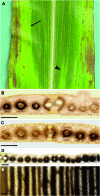The psychedelic genes of maize redundantly promote carbohydrate export from leaves
- PMID: 20142436
- PMCID: PMC2870957
- DOI: 10.1534/genetics.109.113357
The psychedelic genes of maize redundantly promote carbohydrate export from leaves
Abstract
Whole-plant carbohydrate partitioning involves the assimilation of carbon in leaves and its translocation to nonphotosynthetic tissues. This process is fundamental to plant growth and development, but its regulation is poorly understood. To identify genes controlling carbohydrate partitioning, we isolated mutants that are defective in exporting fixed carbon from leaves. Here we describe psychedelic (psc), a new mutant of maize (Zea mays) that is perturbed in carbohydrate partitioning. psc mutants exhibit stable, discrete chlorotic and green regions within their leaves. psc chlorotic tissues hyperaccumulate starch and soluble sugars, while psc green tissues appear comparable to wild-type leaves. The psc chlorotic and green tissue boundaries are usually delineated by larger veins, suggesting that translocation of a mobile compound through the veins may influence the tissue phenotype. psc mutants display altered biomass partitioning, which is consistent with reduced carbohydrate export from leaves to developing tissues. We determined that the psc mutation is unlinked to previously characterized maize leaf carbohydrate hyperaccumulation mutants. Additionally, we found that the psc mutant phenotype is inherited as a recessive, duplicate-factor trait in some inbred lines. Genetic analyses with other maize mutants with variegated leaves and impaired carbohydrate partitioning suggest that Psc defines an independent pathway. Therefore, investigations into the psc mutation have uncovered two previously unknown genes that redundantly function to regulate carbohydrate partitioning in maize.
Figures







References
-
- Birchler, J., 1994. Dosage analysis using B-A translocations, pp. 328–329 in The Maize Handbook, edited by M. Freeling and V. Walbot. Springer-Verlag, New York.
Publication types
MeSH terms
Substances
LinkOut - more resources
Full Text Sources

